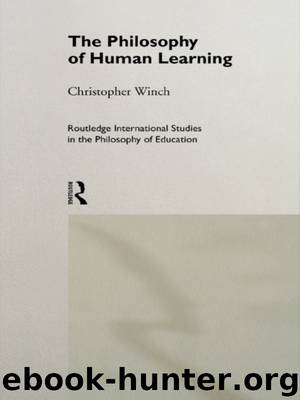The Philosophy of Human Learning by Winch Christopher

Author:Winch, Christopher.
Language: eng
Format: epub
Publisher: Taylor & Francis Ltd
Published: 2011-09-18T16:00:00+00:00
Carruthers’ modified empiricism
The difficulties with traditional empiricism relate to the doctrine of sense data, an imagist account of thinking, and the doctrine of innate mental faculties. If these lead to insuperable difficulties, are we forced to abandon the idea that conceptual structure is, in some way, based on experience and to embrace innatism in its entirety? One recent writer who does not think so is Peter Carruthers. He proposes a modified account of empiricism that strips away the sense datum doctrine and the imagist account of thought, and makes some concessions to innatism without accepting any pictorial theory of representation. In this way he hopes to make intelligible the idea that we acquire at least some of our concepts through experience.
He distinguishes between three senses in which it is possible to possess a concept.
As the possession of a discriminatory capacity Animals, who are evidently able to distinguish between different features of their environment, are able to and do possess concepts. They have such capacities both through instinct and through learning. There is also evidence that they can be conditioned to discriminate under certain conditions between certain kinds of things that it is commonly thought only humans can. In this sense, pigeons can be conditioned to peck only at pictures with humans on and, in a sense, will then be able to recognise humans and so possess the concept human. Some commentators seem to be unaware that there could be any difficulty in attributing the same kinds of recognitional capacity in animals as in humans and calling it concept possession. The fact that animals lack a language is not thought to be a problem provided they show their ability to recognise in some other way.18
As the possession of beliefs and desires associated with a discriminatory capacity In this sense, it is not thought sufficient that an animal possesses a recognitional capacity, but that it also demonstrates that it possesses certain beliefs and desires associated with that capacity. It would be possible, for example, to attribute to a dog the concept being taken for a walk by owner, if the dog was in fact able to discriminate between walk-associated and non-walk-associated features of its immediate environment. It might also be able to anticipate being taken for a walk by the presence of certain signs in its immediate environment; for example, its owner putting on a coat. The dog may well desire to go for a walk and manifest that desire in anticipatory behaviour. Through so doing, it also manifests a belief that it is going to be taken for a walk. It may also manifest this belief by, for example, picking up its lead in its mouth and bringing it to its owner. We might even explain the dog’s action by saying that given its desire to go for a walk and its belief that it was going to be taken for a walk, it picked up the lead in its mouth and brought it to its owner. We do not have to ascribe consciously articulated thoughts to the dog or the ability to explain its actions.
Download
This site does not store any files on its server. We only index and link to content provided by other sites. Please contact the content providers to delete copyright contents if any and email us, we'll remove relevant links or contents immediately.
International Integration of the Brazilian Economy by Elias C. Grivoyannis(107713)
The Radium Girls by Kate Moore(12011)
Turbulence by E. J. Noyes(8014)
Nudge - Improving Decisions about Health, Wealth, and Happiness by Thaler Sunstein(7689)
The Black Swan by Nassim Nicholas Taleb(7097)
Rich Dad Poor Dad by Robert T. Kiyosaki(6591)
Pioneering Portfolio Management by David F. Swensen(6278)
Man-made Catastrophes and Risk Information Concealment by Dmitry Chernov & Didier Sornette(5996)
Zero to One by Peter Thiel(5779)
Secrecy World by Jake Bernstein(4736)
Millionaire: The Philanderer, Gambler, and Duelist Who Invented Modern Finance by Janet Gleeson(4457)
The Age of Surveillance Capitalism by Shoshana Zuboff(4272)
Skin in the Game by Nassim Nicholas Taleb(4232)
The Money Culture by Michael Lewis(4185)
Bullshit Jobs by David Graeber(4176)
Skin in the Game: Hidden Asymmetries in Daily Life by Nassim Nicholas Taleb(3986)
The Dhandho Investor by Mohnish Pabrai(3749)
The Wisdom of Finance by Mihir Desai(3726)
Blockchain Basics by Daniel Drescher(3571)
